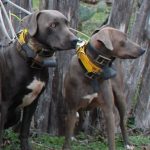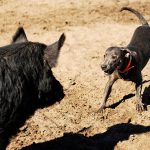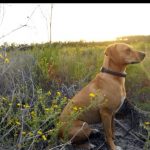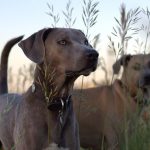The Blue Lacy is a medium-sized, purebred dog which is a working breed that originated in Texas, the US in the mid 19th Century.
This dog breed is very active and intelligent and highly adept at herding, treeing and hunting activities and track games.
There are three permissible color varieties for this breed.
- Blues are any shade of gray from light silver to dark charcoal.
- Reds range from light cream to rust.
- The tri combines these colors with a blue base and distinct red markings as appropriate for trim.
White can appear on the chest, stomach, and paws. It has a muscular body stature, long narrow head, expressive eyes, and an elegant appearance.
History & Origin of Blue Lacy Dogs
The Blue Lacy breed gets its name from Frank, George, Ewin, and Harry Lacy, who were brothers that moved from Kentucky to Texas in the mid-1800s.
They needed an all-around working dog that could help herd free-roaming hogs and cattle, track and tree small game, hunt wild deer and hogs, and watch over the homestead.
The dog needed to be fast, hardworking, trainable, and able to withstand the Texas weather.
Over time, the Lacy brothers refined the breed and developed a high-energy dog that is happiest when it has a job, whether it’s herding cattle or hogs or following a scent trail.
They worked to develop the breed’s natural herding instincts to drive their livestock to market. Since then, the Blue Lacy has remained a true Texas breed and is uncommon outside of the state.
In 2005, it was designated as Texas’s official state dog breed.
The Blue Lacy remains unrecognized by major kennel clubs, though the ABLA (American Blue Lacy Association) has appealed to the AKC to include it in its Foundation Stock Service.
Quick Information and Facts about Blue Lacy Dog
| Characteristics | Details |
|---|---|
| Name | Blue Lacy |
| Other Names | Lacy Dog, Lacy Game Dog, Texas Blue Lacy, Lacy Cur, Red Lacy, Texas Lacy Dog, Texas State Dog, Lacy Hog Dog |
| Color | Blue, Red, Tri-colored |
| Coat | Smooth and Short |
| Breed Type | Purebred |
| Breed Group | Herdings Dog |
| Size | Medium |
| Hieght | 17-24 inches |
| Weight | Female:25 to 45 lbs, Male: 35 to 50 lbs. |
| Life Span/Life Expentancy | 12-16 Years |
| Temperament | Gentle, Energetic, Intelligent, Alert, Loyal, Independent. |
| Shedding | Low |
| Hypoallergenic | No |
| Barking Level | Occasional - but barks loudly. |
| Energy Level | Active |
| Good with Children | Yes |
| Good with Other Dogs | Yes |
| Litter Size | 4-5 puppies |
| Country of Origin | U.S.A |
| Competitive Registration/Qualification Information | ACA, APRI, ACR, DRA, CKC, LGDR, LDBA, NLDA, TLGDA, NKC, UKI |
The Appearance and Color of Blue Lacy Dogs
The American Blue Lacy is medium sized, of noble bearing with hard, clean-cut lines, graceful, well balanced, very fast with free easy movement and alert expression.
The whole appearance of this breed should give an impression of grace and symmetry and of great speed and endurance.
The American Blue Lacy’s expression should be dignified and gentle with deep, faithful, far-seeing eyes
This breed comes in three distinct color variations, blue, red and tricolor. The Blue Lacy comes in shades of gray ranging from a silvery metal tinge to a dark charcoal shade.
The ones in red have a coat that may be light cream or rust colored. The tricolored ones are blue in color with markings of red on their eyes, muzzle, tail, and legs.
Their bright, expressive eyes are orange or yellow. The red and tricolored dogs are also called Blue Lacy because of the blue gene inherent in them.
Temperament and Personality
The Blue Lacy is an alert, intelligent, loyal and a great companion dog. While he’s working, the Lacy is a focused and driven dog, but in the home, he tends to be calm and sweet.
Lacys are generally amazing watchdogs. They are naturally territorial in nature and will protect their property and people from strangers.
Though they share a good rapport with children, the younger ones should be taught to interact with them in a decent way.
Keeping their chasing and herding instincts in mind, it is advisable not to keep them in the same household with smaller pet animals.
Care
Exercise
These active and energetic dogs need their daily dose of exercise in the form of a long walk as well as sufficient play time when not employed on farms or ranches.
They would be comfortable to live on ranches and farms rather than confined spaces or closed apartments lifestyle.
If improperly exercised, they are likely to become bored and hyper as lack of physical activity makes them destructive.
Grooming
The Lacy has a short, smooth coat with little or no undercoat. Brush or comb him weekly to remove dead hair and distribute skin oils and bathe as needed. The coat sheds seasonally.
Health Problems
Blue Lacy, a healthy and hardy breed is not known to suffer from severe health issues apart from food allergies and skin problems.
They are also reported to be afflicted with a rare condition, color dilution alopecia, where its coat has patches.
They have a lifespan of 12-16 years. Many owners of this breed have reported that their Blue Lacy is still hunting and working with cattle at the age of 16.
Training
Like most stock dogs, The Texas Blue Dog may be wary of strangers, so it’s important to socialize him when he’s young.
Blue Lacys are very intelligent and respond well to training, but they need an assertive trainer who can lay down the law without being overly punitive.
Training is a must for this canine breed and socialization must begin early to overcome their natural prey drive and territorial nature
This early exposure will help him learn to be confident in unusual surroundings and hopefully inhibit his instinct to be fearful or even to bite when he encounters unfamiliar situations or people.
He should meet new people and other animals and experience a number of different situations and places to adapt themselves.
Feeding & Diet
Video Texas Blue Lacy Puppy Playing
Interesting Facts
- Texas designated Blue Lacy as the official state dog breed on June 18, 2005.
- In 2008, the proposal was given to make the Blue Lacy the mascot of the Texas A&M University, though it was not a successful one with the former mascot, Reveille VII (Colie) retained.
- The Blue Lacy breed is not recognized by the American Kennel Club.
References
- www.texascooppower.com/texas-stories/history/the-official-dog-of-texas/
- www.landreport.com/2012/05/lands-best-friend-blue-grit/


















